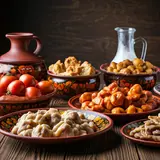
Rediscovering Russia's Culinary Heritage

As we delve into the nostalgia of bygone eras, let's not overlook the simple pleasure of food. From preparation to consumption, eating is a cultural experience. Today, we'll explore the Russian perspective on food, drawing from vintage sources.
Russian cuisine is renowned for its diversity and hearty flavors, a reflection of the country's harsh climate. To survive the frigid winters, Russians developed a cuisine rich in calories. Let's dive into this 1960s cookbook to better understand the Russian relationship with food:
However well fed they may be on other diets, Russians, after a time, feel a kind of emptiness only Russian food will fill. All other cooking eventually seems either too spare and lean or too fancy. And food is of great importance in the Russian's life. It was a featured pastime in the long idle days of the country aristocracy and landed proprietors. Meals and snacks were sometimes the only events of the day, and the supervision of the meals and the kitchen, root cellar, drying room, ice houses, and preserve-filled pantries was the main concern of the mistress of the house.
This preoccupation with food is so constantly reflected in classic Russian literature that I first thought of writing a Russian cookbook while translating Russian nineteenth-century fiction. Working at my typewriter with distracting images of pirozhky and other delicacies constantly evoked by the Russian text, I felt more and more sympathy for one of Chekhov's heroes who complained he had never been able to accomplish anything because the moment he set to work, his concentration was broken by thoughts of food--even the image of a boiled potato was enough to distract him for a day.
In Gogol's story of an elderly couple, "The Old World Landowners," the woman asks at every pause in the day—when her husband wakes up from his after-dinner nap, when he gets out of his armchair after reading the morning mail, or if he wakes in the middle of the night, "How would you like a few little apple dumplings with sour cream?" If he shows no interest, she continues, suggesting mushroom fritters or hot meat pastries or poppyseed cakes until she breaks down his resistance and can patter contentedly to the kitchen to supervise the preparation.
The author, Barbara Norman, describes the deep-rooted connection between culture and food, in this case, from the Russian perspective. Russian cuisine, with its rich flavors and variety, fills a unique void that other cuisines cannot, and this cultural significance is reflected in Russian literature, where food is often a central theme. Norman, apparently inspired by the constant references to food in classic Russian literature, ultimately wrote this Russian cookbook for American audiences. The deep-seated love for food found in every Russian is exemplified by characters like Chekhov's hero, who is constantly distracted by thoughts of food, and Gogol's elderly couple, whose conversations revolve around culinary delights.
The book, if you can find it, is The Russian Cookbook, published in 1967.